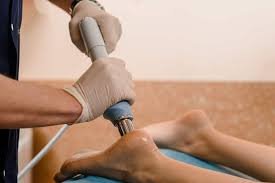Shockwave therapy, also known as extracorporeal shockwave therapy (ESWT), is a growing treatment option for chronic pain conditions. While the focus is often on its physical benefits, ESWT can also have a significant impact on a patient’s mental well-being.
Living with Chronic Pain
Chronic pain, especially in areas like the tendons or heels, can be incredibly frustrating. It can limit your mobility, making everyday tasks difficult. This loss of function can lead to feelings of isolation, helplessness, and even depression. Studies show that adults with chronic pain are three times more likely to experience depression than those without [1].
ESWT: A Beacon of Hope
ESWT offers a glimmer of hope for those struggling with chronic pain. By stimulating tissue healing and potentially reducing pain signals, this treatment can offer a path back to a more active life. This can have a profound psychological impact.
The Psychological Benefits
The potential psychological benefits of ESWT are multifaceted:
-
Reduced Anxiety and Depression: As pain lessens and mobility improves, patients may experience a decrease in anxiety and depression.
-
Improved Quality of Life: Regaining the ability to participate in activities you enjoy can significantly improve your overall quality of life and sense of well-being.
-
Increased Self-Esteem: Feeling more in control of your body and able to perform daily tasks can boost self-esteem and confidence.
It’s Not Just Physical Discomfort
While ESWT itself may cause some temporary discomfort, it’s important to remember the psychological discomfort associated with chronic pain. For many, the potential benefits far outweigh any temporary side effects.
Talking to Your Doctor
If you’re struggling with chronic pain, discuss ESWT with your doctor. They can assess if you’re a good candidate for the treatment and address any concerns you may have. Remember, healing goes beyond the physical. Addressing the mental toll of chronic pain can be just as important as treating the physical symptoms.
Disclaimer: This blog is for informational purposes only and should not be considered medical advice. Always consult with a qualified healthcare professional before starting any new treatment.
For more information about shockwave therapy, have a look at this article by Mayo Clinic https://www.mayoclinic.org/medical-professionals/physical-medicine-rehabilitation/news/the-evolving-use-of-extracorporeal-shock-wave-therapy-in-managing-musculoskeletal-and-neurological-diagnoses/mac-20527246




